When to use a personal loan to pay off credit card debt

Key takeaways
- Using a personal loan to pay off credit card debt could be a smart move if you can secure a lower rate or are juggling multiple credit card payments
- Paying off credit card debt with a personal loan may not be right for you if you’re overwhelmed by debt
- Before you use a personal loan to pay off debt, review your spending habits
In a perfect world, no one would need to take out a loan to consolidate and pay off debt. In the real world, however, sometimes borrowing money is the only way to dig your way out.
This is mostly due to high interest rates on credit cards. With the average credit card APR (annual percentage rate) at 19.61% as of February 2026, consumers are stuck paying significant sums of money in interest. Because of this, a small amount of their minimum payment actually goes towards paying down a credit card balance.
These challenges are why many people consider consolidating their credit card debt with a personal loan.
When to use a personal loan for credit card debt
Debt consolidation works by taking out a single loan to pay off multiple other debts. True, consolidating debt with a personal loan means trading one kind of debt for another. However, this strategy has advantages — if you can qualify for a personal loan with affordable interest rates and fair terms.
You can qualify for a lower interest rate
Qualifying for the best personal loan interest rates and terms typically requires a FICO score of 800 or higher. But you may get competitive (that is, close to average) rates with a score of 670 or higher.
Either way, personal loans come with average APRs of 12.27% as of February 2026. That’s considerably lower than the current average credit card APR of 19.61%, meaning your interest savings can be substantial.
You can consolidate your debts into one payment
If you’re juggling several credit cards with their own payments and APRs, it can be difficult to organize a debt repayment plan. You have to make sure you’re making and maximizing your payments each month. Using a personal loan to pay off debt helps you get rid of multiple payments and go down to one payment per month — and hopefully with a much lower APR.
Consider using a debt repayment calculator to determine how much sooner you could pay off your debt with a lower interest rate.
Think about this simple example. Imagine you have $5,000 in debt on a credit card with a 17% APR and $7,000 in debt on a second credit card with a 21% APR. You are only able to put $100 towards each credit card per month with a total of $200 each month.
At that rate, you are not even paying off all of your interest, so you will never pay off the debts. If you can secure a personal loan for your total of $12,000 in credit card debt with an APR of 10%, you will be able to contribute your $200 each month and start paying off more than your interest each month.
You can secure a lower monthly payment
If you’re struggling under the weight of your credit card debt and you are still spending more on payments each month than you earn, a personal loan with a lower APR and set repayment schedule may be exactly what you need.
It is possible you can secure a lower monthly payment on your consolidated debt with a lower APR and a long enough repayment timeline. You’ll need to play around with a debt consolidation calculator to know for sure.
You want to know exactly when you’ll be debt-free
One big problem with credit cards is if you keep using them for purchases, you may never pay off your debt. Personal loans, on the other hand, come with a fixed interest rate, a fixed monthly payment and fixed repayment schedule that dictates the exact date you’ll pay off your debt for good.
If you’re tired of making payments toward credit cards but never making much progress, you might be better off consolidating debt with a personal loan, and then switching to cash or debit cards.
When not to use a personal loan for credit card debt
Signing up for a personal loan to pay off credit cards can be a money-saving endeavor, but that’s not always the case. Signs you may want to try a different debt consolidation method completely can vary from person to person, but they may include the following.
You have a small amount of debt you can pay off quickly
If you have a fairly manageable amount of debt that you can comfortably pay off within 12 to 21 months, you may want to consider signing up for a balance-transfer credit card instead of a personal loan to pay off debt. With a 0% APR credit card, you can frequently secure zero interest on balance transfers for up to 21 months, although a balance transfer fee will likely apply.
While balance transfer fees may cost up to 3% to 5% of your transferred balances upfront, you could easily save hundreds of dollars or more on interest if you pay down debt during your introductory offer. Some balance transfer credit cards also offer rewards and consumer benefits, so make sure to compare offers.
You are going to keep using the same spending habits
If most of your credit card debt is due to bad spending habits, consolidating your debt won’t stop you from getting into more debt if you continue practicing bad spending behaviors.
You may want to rethink your financial strategy before you try to consolidate debt so that you can get a handle on your spending. Think about consulting a personal finance coach or learning about different budgeting methods. Find what works for you and make habits that will keep you out of debt in the long run before you try to tackle a symptom of your larger spending problem.
You desperately need help with your debt
Finally, there are times when you might have so much debt you feel powerless to pay it off without help. In these circumstances, it’s possible working with a debt relief company or non-profit Consumer Credit Counseling Services may be your best bet. You can also look into debt management plans or debt settlement plans, although the Federal Trade Commission (FTC) warns that not all third-party companies offering debt relief help are reputable.
If you have so much debt that it seems mathematically impossible for you to pay it off in your lifetime, you might also be a candidate for bankruptcy. It can help to meet with a CCCS counselor before you decide. To weed out any bad players, the FTC says you should check out any agency you’re considering with your state Attorney General and local consumer protection agency.
Other options for managing credit card debt
While using a personal loan to pay down credit card debt can be helpful, it’s not the best choice for everyone. Some alternatives include:
Bottom line
Imagine never having to pay a credit card bill again, or actually having the money you want to take a vacation or do something fun. By focusing on debt repayment, you can free up cash each month — even if your main goal is simply having some extra money to save.
A personal loan can make a lot of sense for debt consolidation, but make sure to consider all the options and tools that may be available to you.
Getting out of debt requires you to stop racking up more bills you can’t pay. No matter which debt reduction option you choose, stop using credit cards and switch to cash or your debit card while you’re in debt repayment mode.
Why we ask for feedback Your feedback helps us improve our content and services. It takes less than a minute to complete.
Your responses are anonymous and will only be used for improving our website.
You may also like

Which cards still offer a 21-month intro APR?

How debt consolidation loans work




